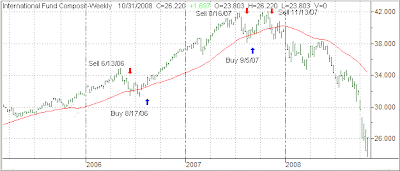 Reader Don had an interesting experience in that he is a trend follower by heart but also wanted to experience the other (dark) side of investment life by splitting his portfolio and going both ways; trend following and buy-and-hold.
Reader Don had an interesting experience in that he is a trend follower by heart but also wanted to experience the other (dark) side of investment life by splitting his portfolio and going both ways; trend following and buy-and-hold.
Here’s what he had to say:
I subscribe to Al Thomas, read your blog, and get your weekly update.
What a great, invaluable service you provide. There is really no excuse for anyone to be sitting in a 40% down position. You give your information free, and one just has to go with the TTI. How hard is that? I have one account that is in cash and another that has 20% buy and hold in ETFs. I wanted to experience buy and hold through a bear market. It feels lousy, but I have stayed the course. It is down thousands of dollars.
Could you give me your opinion on the “other side of the issue”, as follows?
1. There is a very convincing (they convinced me to try it) website (FundAdvice.com)that prices out the buy and hold situation a long way back and shows there are years where you have significant draw downs, yet, if you stay the course, the data shows that it still produces a 10-13% gain over a 20 year period. That website also uses broad market timing as an option.
2. There is Ray Lucea(spelling?) who states that over any 7 year period, you will have a gain if you buy good growth MF in a diversified portfolio.
3. Radio advice: For example, Mike Cavanaugh(spelling?), an Atlanta independent financial advisor, says 10 years is the minimum time to hold MFs in index funds.
So it is little wonder that most people use buy and hold.
In theory, holding an investment over the long-term sounds fine and good, but there are a couple of other issues to consider.
First, emotionally most investors are not prepared to handle any sharp downturns. Sure, they are getting sold on the idea that the market always comes back. OK, if that is so, then why are just about all investors incredibly upset about seeing their portfolios taking a haircut of some 40% this year? That fact should not really matter if you’re convinced that the market will come back at sometime.
Here’s where theory and practice clash big time. Before a loss actually happens, investors can theorize all they want as to how they will ride out any potential downturns. Once disaster strikes, they find out that they were not prepared to take the hit after all.
That brings up a second issue, which I have touched on many times before. If you take a portfolio hit of some 40% that means that you have to earn some 66% on the remaining balance just to break even.
How long will that take?
If the market cooperates, maybe 5 years or even longer. In other words, you will be wasting the next 5 years of your financial life to make up losses you should have avoided in the first place. Since your financial life is considerably shorter than your physical life, the impact can be severe.
It’s interesting that during the last bear market of 2000 – 2002, I received the same sounding emails and calls as I am getting now. Investors are upset because they feel mislead by the usual investment garbage of asset allocation and Modern Portfolio Theory (MPT), which did nothing to protect their capital. Not only that, it wiped out years of profits putting most investors severely behind in their investment/retirement goals or forcing them to extend their work life.
But hey, in the really long-term, the markets will come back, so there is nothing to be concerned about. Yeah right! Following that theory, we can all retire about six years after we have died.
 Relief that the election mud slinging is finally over may have contributed to yesterday’s solid rebound, although some sense of reality may set in once the results of the Presidential race are known, which they were not at the time of this writing.
Relief that the election mud slinging is finally over may have contributed to yesterday’s solid rebound, although some sense of reality may set in once the results of the Presidential race are known, which they were not at the time of this writing.
 In a recent post
In a recent post


